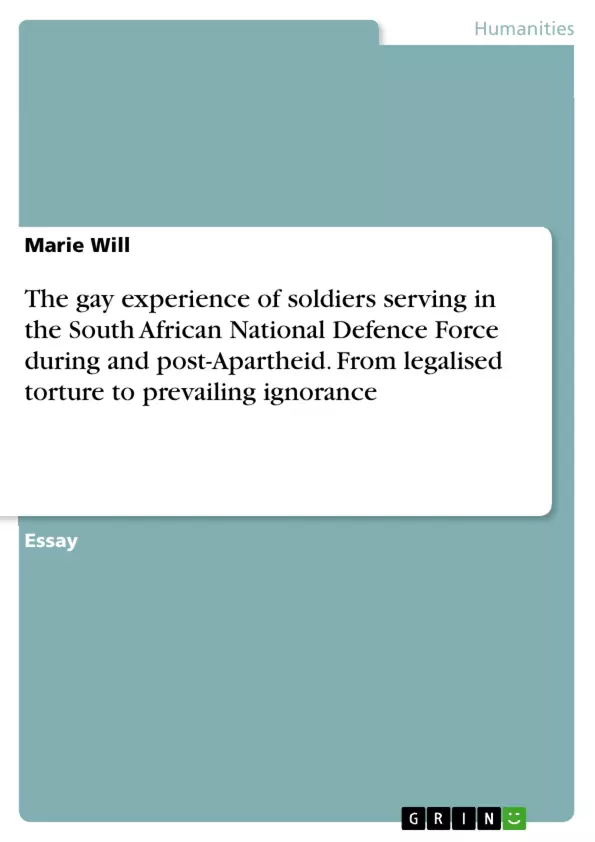In the wake of the abolition of Apartheid, many narratives of fictional and non-fictional nature have been and continue to be published about the experiences of people serving in the military in the 1970s and 1980s. One of the most notable fictional works is André Carl Van Der Merwe’s "Moffie" (first edition published in 2006), which follows white closeted Nicholas Van Der Swart as he grows up in a conservative Christian household and is conscripted into the military at age 17. From the start, he hates the experience, describing it as being “thrown into hell [...] forced to kill people I don’t know, for a cause I don’t believe in”. Nearly thirty years later, now openly gay author and spokesman Siya Khumalo, who at the time was still in the closet, was one of many men of colour who joined the SANDF in an attempt to protect the new government that was claiming equal rights for gay people (2018). Both Van Der Merwe’s and Khumalo’s narrative are crucial to the understanding of the development in anti-LGBTQ+ sentiments in South Africa during and post-Apartheid.
Table of Contents
- Introduction: The South African National Defence Force
- Being gay in the Apartheid military: Legalised torture
- Being gay in the post-Apartheid military: Prevailing ignorance
- Conclusion
Objectives and Key Themes
This paper explores the experiences of gay soldiers serving in the South African National Defence Force (SANDF) during and after the Apartheid era. It aims to provide a comprehensive understanding of the challenges and discrimination faced by LGBTQ+ individuals within the military context, highlighting the evolution of attitudes and policies towards homosexuality.
- The history and impact of Apartheid policies on the SANDF
- The criminalization and persecution of homosexuality in South Africa during Apartheid
- The legacy of Ward 22 and its impact on LGBTQ+ soldiers
- The transition to a post-Apartheid society and the challenges of inclusion for LGBTQ+ individuals in the military
- The role of literature and personal narratives in understanding the experiences of LGBTQ+ soldiers
Chapter Summaries
- Introduction: The South African National Defence Force: This chapter provides an overview of the history of the SANDF, focusing on the implementation of mandatory military service during the Apartheid era and its subsequent abolition after the fall of Apartheid. It contextualizes the paper's focus on LGBTQ+ experiences within the broader socio-political landscape of South Africa.
- Being gay in the Apartheid military: Legalised torture: This chapter delves into the discriminatory practices and policies against homosexual individuals in the SANDF during the Apartheid regime. It examines the use of the term "Moffie" as a derogatory slur and explores the experiences of closeted gay soldiers in a hostile environment. The chapter also sheds light on the horrific treatment of LGBTQ+ individuals at Ward 22, a military hospital where aversion therapy was used to "cure" homosexuality.
Keywords
This paper explores key themes related to the experiences of LGBTQ+ soldiers in the South African National Defence Force (SANDF), including Apartheid, homosexuality, discrimination, aversion therapy, Ward 22, military service, and inclusion. It examines the evolution of attitudes and policies towards homosexuality in South Africa, highlighting the challenges faced by LGBTQ+ individuals in a military context.
Frequently Asked Questions
What was the experience of gay soldiers during Apartheid in South Africa?
During Apartheid, gay soldiers in the South African Defence Force faced severe persecution, derogatory slurs like "Moffie," and in extreme cases, legalized torture through aversion therapy.
What was Ward 22?
Ward 22 was a notorious military psychiatric unit at Voortrekkerhoogte where gay conscripts were subjected to aversion therapy, including electric shocks and chemical castration, in an attempt to "cure" their homosexuality.
How did the transition to post-Apartheid change the military for LGBTQ+ individuals?
While the new government claimed equal rights, the transition was marked by "prevailing ignorance." Soldiers like Siya Khumalo joined the SANDF expecting equality but still encountered deep-seated anti-LGBTQ+ sentiments.
Who is André Carl Van Der Merwe?
He is the author of the semi-autobiographical novel "Moffie," which details the harrowing experiences of a young gay conscript in the South African military during the 1980s.
What role does literature play in understanding this history?
Personal narratives and fictional works like "Moffie" are crucial for documenting the psychological and physical abuse that was often omitted from official military records during the Apartheid era.
Was military service mandatory in South Africa?
Yes, during the Apartheid era, there was mandatory national service for white South African males, which forced many closeted gay men into a hostile and conservative military environment.
- Quote paper
- Marie Will (Author), 2022, The gay experience of soldiers serving in the South African National Defence Force during and post-Apartheid. From legalised torture to prevailing ignorance, Munich, GRIN Verlag, https://www.grin.com/document/1369014



